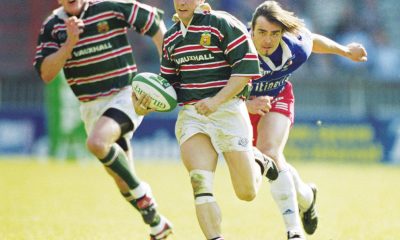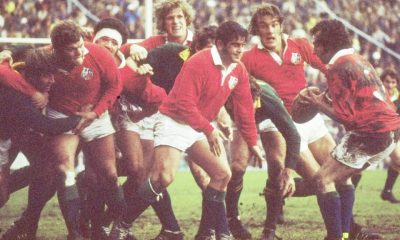 At the end of a week when English football got its knickers in a nationality twist, Ireland‘s next scrum-half can be identified as a former Welsh student from Brecon.
At the end of a week when English football got its knickers in a nationality twist, Ireland‘s next scrum-half can be identified as a former Welsh student from Brecon.
Kieran Marmion found his way from the market town in Powys to Connacht via school on the Fylde coast and university in Cardiff. That Mike Ruddock put him on the fast track to an Ireland cap makes Marmion’s conversion all the more ironic.
Wales’ Grand Slam coach until he fell foul of the St. Valentine’s Day masquerade in 2006, Ruddock has no doubt that his
22-year-old protégé will go all the way.
“I think Kieran will definitely play for Ireland,” he said. “He has a really good rugby intellect, the complete skills set and doesn’t panic.”
Marmion’s case history is the latest example of how far the four home countries cast their nets in the trawl for new talent. Not for them the simplistic view that you play for the country of your birth, as expressed by the Arsenal footballer Jack Wilshere in response to the FA’s opportunistic attempt to slap their shirt on a Belgian player of Kosovan parentage, Adnan Januzaj.
Ireland have every right under international rules to claim Marmion as a son of the ould sod. His father, from Loughrea in Co. Galway, always wanted his son to wear the green.
The IRFU’s recruiting agency on the English mainland, the Irish Exiles, appear to have been sharper off the mark in recognizing Marmion’s talent than anyone in Wales or, for that matter, England. He went to school in Lancashire as did another scrum-half of Irish birth, England World Cup winner, Kyran Bracken.
“I would have thought Wales would have known of Kieran, what with him being a Brecon boy,” Ruddock said from Dublin in his capacity as Ireland’s U20 head coach. “Once the Exiles made me aware that he was Irish-qualified, I delved a bit deeper.
“I found out that he was at university in Cardiff but that he hadn’t made the first team. He wasn’t displaying the form then that he’s shown since. We gave him a trial, he impressed and hasn’t looked back. That happens to some players. They get a chance and suddenly they kick on.”
Marmion played a starring role for Ireland at the 2012 Junior World Cup in South Africa where they famously beat the hosts. On the strength of that, he made his Connacht debut at the start of last season, against Cardiff Blues and finished it by winning promotion to Ireland’s full squad in north America.
That put him third in line to Munster’s Lion Conor Murray behind Eoin Reddan and Isaac Boss. Given that the Leinster pair are well into their thirties, Marmion may be about to soar higher still, as indicated by his man-of-the-match performance for Connacht on Friday.
If the cap comes next season, he will not be the first scrum-half with Brecon connections to represent a country other than Wales, Dewi Morris having blazed the trail with England during the early Nineties.
Marmion has genuine Irish connections unlike those who qualify via the three-year residency rule, most recently Ulster’s South Africans Rob Herring and Robbie Diack who appeared for Emerging Ireland during the Tblisi Cup in Georgia last June. Some argue that three years is indecently brief and that it ought to be five, as in football.
As for the play-for-the-country-of-your-birth rule, that particular horse has long bolted. Were the stable door to be closed it would cause chaos, eliminating at a stroke six of the current England squad (Alex Corbisiero, the Vunipola brothers, Brad Barritt, Dylan Hartley, Manu Tuilagi).
Four from Wales would go – Toby Faletau plus the English-born trio of Jonathan Davies, George North and Alex Cuthbert. Scotland would lose more not just those born across the border but across the Equator (Sean Maitland, David Denton) and across the Atlantic, as in Nashville, birthplace of Glasgow wing Tommy Seymour.
And the All Blacks would have been obliged to win the last World Cup without their Samoan triumvirate, Jerome Kaino, Mils Muliaina and Isaia Toeava.





























You must be logged in to post a comment Login